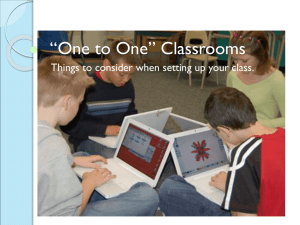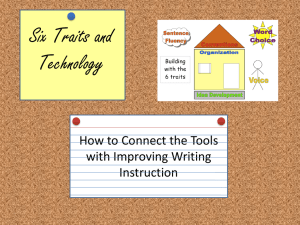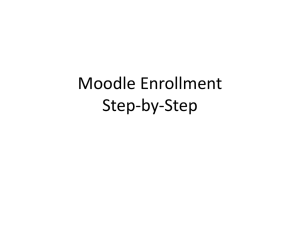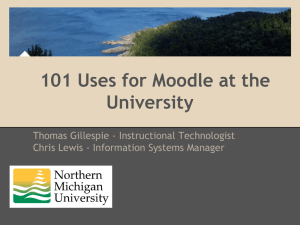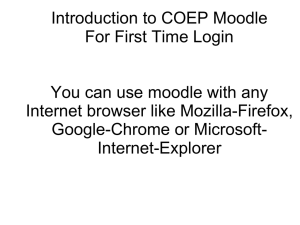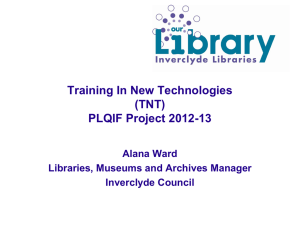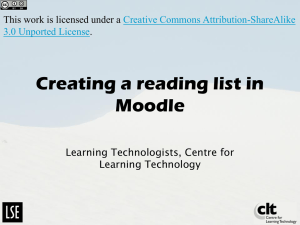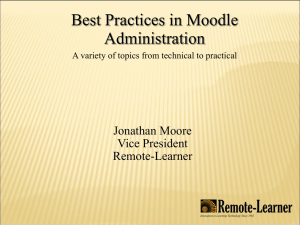(2007). McGreal, R., Stauffer K., & Tin, T. Mobile Moodle
advertisement
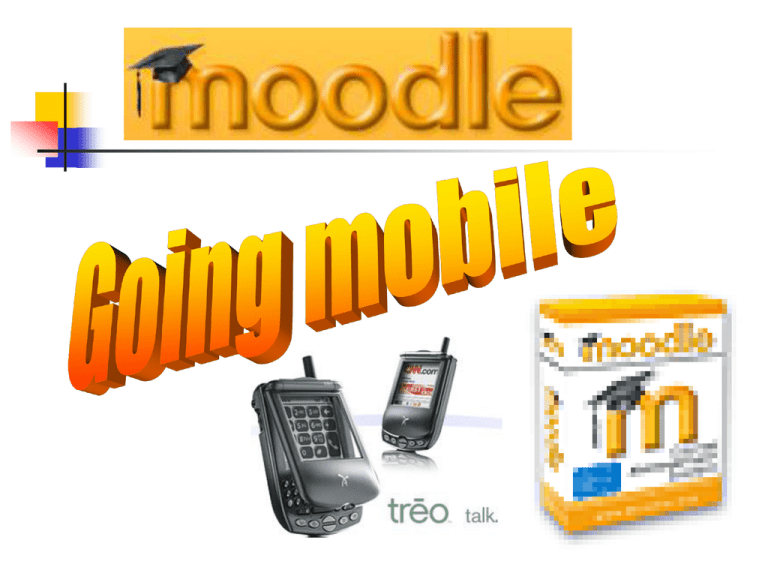
What technology has done more to destroy human community than any other? Could it be the portable book? PCs in your Pocket Antelope Modular Computing Platform Amida Simputer Sony Vaio PCGU1 Sony Vaio VGN 170 The Virtual Keyboard New Generation Sony Mylo Apple iPhone New Generation Flipstart OQO Mobile with Moodle Palm Treo 650 Palm OS with 10 Mb RAM 28 Mb ROM Email Organizer Web browser Screen size: 320 X 320 pixels Blazer Browser XHTML CSS 1 Javascript Cookies Some SSL connexions Moodle 1.5.3 Layout • Three columns rendered as one column • “Fluid” layout design NOT “fixed” • Use “float” positioning (set width as %) • Avoid BLOCK elements & BLOCK positioning • Frames work well in Moodle • Sans serif fonts work best - default http://download.moodle.org/modules Best Practices • Object & embed • Flash • Audio • Video • Images • Background colour Conclusion Moodle can be implemented on mobile devices BUT Course developers need to understand the limitations Javascript modules do not work Limited interactivity is possible Background SCIS all courses on Moodle Research emphasis on mobile learning Moodle at AU is not yet mobile-friendly Research findings, support giving students the option to use mobile devices. #1 “Would you like to take other courses or units using mobile devices?” 80% favourable (convenience & portability) Most would primarily use a PC with PDA as alternative #2 “Is it very useful having access to course materials from a mobile device?” 88 % Agreed or Strongly Agreed 88% used a desktop with some use of a handheld most requested: forums, quizzes, and assignments The Student View The Student logs in through myAU Regular View Mobile View The Course Link in myAU takes the student to Moodle Regular View Mobile View Moodle links to content in an outside CMS Regular View Mobile View The server detects the device and delivers the appropriate style sheet Future Plans and Considerations Focus on basics of moving to Moodle Update AU websites, including Moodle Future in peer-to-peer applications. Purpose of Project Develop and test innovative approaches to English as a Second Language (ESL) learning using mobile devices to deliver ESL lessons and allowing practice with feedback using a variety of testing methods Student Preference for Question Type Student opinion poll about whether a question type is suitable for mobile devices True/False, 93% Multiple Choice, 75% Word Ordering, 47% Matching, 18% Multiple Choice True/False Matching Word Ordering Pre-test vs Post-test vs Retention A Comparison of the Pre-test (1), Post-test (2), and Test scores Retention Test (3) 20 18 16 14 12 10 8 6 4 2 0 1 2 Tests 3 Flexibility to Learn Anywhere and Anytime The technology provides flexibility for m e to learn anyw here and at anytim e 4% 0% 4% 2% 34% Strongly Agree Agree Neutral Disagree Strongly Disagree No Response 56% Quality of Learning Learning with mobile technology increases the quality of my learning experience 2% 4% 4% 17% Strongly Agree Agree 21% Neutral Disagree Strongly Disagree No Response 52% Take Other Lessons Using Mobile Devices I would like to take other lessons using mobile technology 6% 0% 15% 13% Strongly Agree Agree Neutral Disagree 21% Strongly Disagree No Response 45% Student Feedback on the Use of Mobile Technology Students reported positive experience with course & mobile technology a good supplementary medium of learning Convenient waiting for the bus or being on the bus or whenever there is some spare time flexibility anytime availability concern about cost of Internet access Suggestions for Future Delivery audio more examples more interaction with teachers on mobiles Larger screen size for ease of reading Acknowledgements The research team would like to thank the following organizations for supporting this project. The Canadian Council of Learning Athabasca University Alberta Science and Research Authority Canada Foundation for Innovation Canadian Virtual University National Adult Literacy Database Toys? Sony Playstation Mac Mini iPod Gizmondo = 2 jiffies or 200 milliseconds


